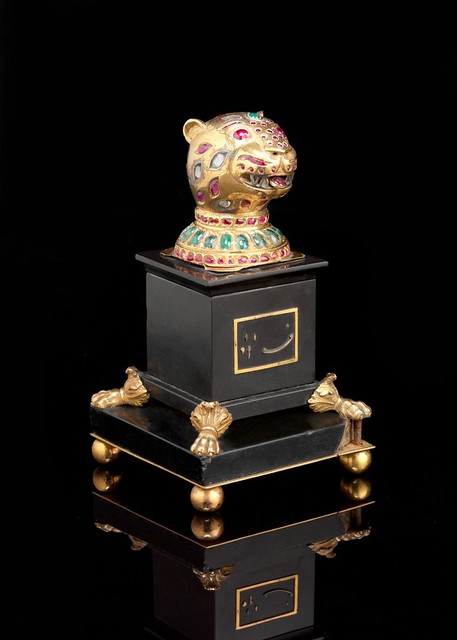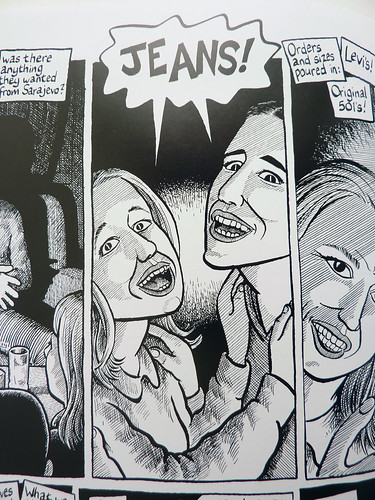"One Of These Days" by Gabriel García Márquez
Halqa Arbab-e-Zauq NY had a session on Marquez last weekend. I attemtped to translate one of his short stories in Urdu.
It is the story of a dentist, who loves what he does, is apparently not that busy but would rather not attend to the Mayor. Internal conflict between the healer and the rebel is cleverly portrayed.
His signature mark is attention to details and inner feelings.
English translation can be viewed at:
http://www.classicshorts.com/stories/ootdays.html
ایسا ہی ایک دن
سوموار کی صبح گرم اور خشک تھی - آؤریلیو ایسکووار ماہر دنداں بلا ڈگری صبح سویرے اٹھنے والا شخص تھا اور چھ بجے مطب پہنچ چکا تھا - اس نے چند مصنوئی داںت جو ابھی تک پلستر کے سانچے میں آویزاں تھے شیشے کے کیس سے نکالے اور مشت بھرے اوزار میز پرلمبائی کی نسبت ایسے سجاۓ کے جیسے نمائش لگی ہو - اس نے بغیر کالر کے ایک لکیر دار کرتا پہنا ہوا تھا جو طلائی بٹنوں سےگلے تک بند تھا - اس کی پتلون سسپنڈرز کی بدولت صحیح مقام پہ معلق تھی - اس کا بدن دبلا اور تنا ہوا تھا اور اس کے دیکھنے کا انداز ماحول سے مطاقبت نہ رکھتا تھا جیسے کے ایک بہرہ دیکھ رہا ہو -
میز پہ سامان آراستہ کرنے کے بعد اس نے اپنی کام کرنے والی کرسی کی طرف ڈرل کھینچی اور مصنوئی دانتوں کو چمکانے کے لیے بیٹھ گیا -ایسا لگتا تھا کہ وہ سوچنے کی ضرورت سے بےنیاز ہو کر کام کر رہا تھا مگر وہ باقاعدگی سے لگا رہا اور اکثر دفعہ ضرورت کے بغیر ڈرل کو پاؤں سے پمپ کرتا رہا -
آٹھ بجے کے بعد وہ کچھ دیر کے لیے آسمان کو دیکھنے کے لیےکھڑکی کے پاس رکا - پڑوس کی چھت کی پر دو اداس گدھ سستا رہے تھے - وہ اس خیال سے واپس کام پر لگ گیا کہ دوپہر تک بارش پھر لگ جاۓ گی - اس کے گیارہ سالہ بیٹے کی چیرتی آواز نے اس کا دھیان منتشر کر دیا -
'پاپا'
'کیا؟'
'میئر پوچھ رہا ہے کہ آپ اس کا دانت نکال دو گے ؟'
'اسے کہہ دو کہ میں یہاں نہیں ہوں '-
وہ سونے کا دانت چمکا رہا تھا - اس نے اسے بازو کی حد تک اٹھایا اور آنکھیں نیم وا کر کہ اس کا معائینہ کرنے لگا -اس کا بیٹا برابر کی انتظارگاہ سے پھر چیخا -
'وہ کہہ رہا ہے کہ آپ ادھر ہی ہو کیونکہ وہ آپ کو سن سکتا ہے '
دندان ساز دانت کا معائینہ کرتا رہا - کام ختم کر چکنے کے بعد اس نےدانت کو میز پر رکھا اور بولا -
'کیا خوب ہے "
اس نے ڈرل دوبارہ چالو کی -اور ایک گتے کے ڈبے سے جہاں وہ ادھورے منصوبے جمع رکھتا تھا ایک برج کے کئی پرزے نکالے اور سونا پالش کرنے لگا -
'پاپا'
'کیا؟'
اس کے چہرے کا تاثر تبدیل نہیں ہوا تھا -
'وہ کہہ رہا ہے کہ اگر آپ نے اس کا دانت نہ نکالا تو وہ آپ کو گولی مار دے گا '
ہڑبڑاے بغیر انتہائی سکون کے ساتھ اس نے ڈرل کے پیڈل کو روکا، اسے اپنی کرسی سے ہٹایا اور میز کے نچلے دراز کو پورا کھولا - روالور وہاں موجود تھا -
'ٹھیک ہے ' اس نے کہا - 'اسے کہو کہ اندر آ جاۓ اور مجھے اڑا دے '-
اس نے کرسی کو دروازے کی مخالف سمت میں گھمایا - اس کا ہاتھ دراز کی نکر پہ تھا - مئیر دروازے سے نمودار ہوا -اس کے چہرے کا بایاں حصہ شیو شدہ تھا مگر دایاں حصہ سوجا ہواتھا اوراس پہ پانچ دن کی داڑھی تھی -
دندان ساز کو اس کی آنکھوں میں کئی راتوں کی بےچینی دکھائی دی. اس نے دراز کو اپنی انگلیوں کی پوروں سے بند کر دیا اور نرمی سے کہا :
'بیٹھ جاؤ '
'صبح بخیر ' مئیر بولا -
'بخیر '
آلات جراحی پانی میں ابل رہے تھے مئیر نے اپنا سر کرسی پہ ٹیکا -اسے کچھ سکون محسوس ہوا - اگرچہ اس کی سانسیں ٹھٹھری ہوئی تھیں -اس نے ماحول کا جائزہ لیا - یہ ایک غریبانہ دفتر تھا -ایک پرانی لکڑی کی کرسی، پاوں سے چلنے والی ڈرل،شیشے کے کیس میں مٹیالی بوتلیں - کرسی کے سامنے کھڑکی اور اس کے اوپر کندھے تلک کپڑے کا پردہ -جب اس نے دندان ساز کو آتے دیکھا تو اس نے اپنی ایڑیاں کھینچیں اور منہ کھول دیا -
آریلیو ایسکووار نے اس کا منہ روشنی کی طرف کیا -سوجے ہوۓ جبڑے میں بیمار دانت کا معائینہ کرنے کے بعد اس نے مئیر کا منہ اپنی انگلیوں کے ایک محتاط دباؤ کے ساتھ بند کیا-
'یہ کام سن کیے بغیر ہو گا ' اس نے کہا -
'وہ کیوں؟'
'اس لئیے کہ یہ پیپ شدہ ہے '
مئیر نے اس کی آنکھوں میں آنکھیں ڈال کر کہا 'ٹھیک ہے' اور مسکرانے کی کوشش کی -
دندان ساز نے مسکراہٹ کا جواب مسکراہٹ سے نہ دیا- وہ ابلے ہوے اور جراثیموں سے پاک آلات کی طشتری کام کرنے والی میز پہ لایا -کسی عجلت کے بغیر انہیں ایک ٹھنڈے چمٹے کی بدولت نکالا -جوتے کی نوک سے اس نے تھوکدان کا منہ کهولا-اور اپنے ہاتھ دھونے واش بیسن کی طرف چلا گیا - یہ سب کچھ اس نے مئیر کی طرف دیکھے بغیر کیا- لیکن اس دوران مئیر نے اس سے اپنی آنکیں نہ ہٹائیں -
یہ نچلی عقل داڑھ تھی - ماہر دنداں نے اپنے پاؤں پھیلاۓ اور بیمار دانت کو گرم چمٹے سے جکڑا -مئیر نے کرسی کے بازو بھینچے ، اپنی پوری طاقت سے ایڑیاں کسیں ، اسے اپنا پتہ پانی ہوتا لگا ہوا مگر اس نے منہ سے ایک آواز نہ نکالی - دندان ساز نے اپنی کلائی کو جنبش دی- جذبات میں آے بنا سرد مہری سے اس نے کہا -
'اب قائم ہو جاؤ- جو تم نے ہمارے بیس مارے تھے،ان کی قیمت دینے کا وقت آ گیا ہے '
مئیر کو اپنے جبڑے میں ھڈیاں چکنا چور ہوتی محسوس ہویں اور اس کی آنکھیں اشکوں سے بھر گیں -مگر جب تک دانت باہر نہ آیا اس نے سانس روکی رکھا -پھر اس نے اسے اپنے آنسوں کے بیچ سے دیکھا - یہ دانت اسے اپنے درد سے اتنا غیر لگا کہ اسے پچھلی پانچ راتوں کے عذاب کی وجہ سمجھ نہ آئی -
پسینے سے شابور اور ہامپتے ہوے وہ اگالدان پہ جھکا اور قمیض کھولتے ہوے اپنی پتلون کی جیب سے رومال نکالنے لگا - دندانساز نے اسے ایک صاف کپڑا تھمایا اور کہا
'آنسو پونچھ لو'
مئیر نے ایسا ہی کیا- وہ کانپ رہا تھا. جب ڈنٹسٹ اپنے ہاتھ دھو رہا تھا، اس نے اکھڑتی ہوئی چھت پہ مکڑی کا مٹیالا جالا اور اس میں اس کے انڈے اور کچھ مرے ہوے کیڑے دکھائی دیے - ڈنٹسٹ مڑا اور ہاتھوں کو سکاتے ہوے بولا -'اب سو جانا اور نمکین پانی سے غرارے کرنا '-
مئیر اٹھ کھڑا ہوا ' فوجی نخرے سے سلوٹ مارتے ہوے الوداع کہا اور کوٹی کے بندھ بندے بغیر ٹانگیں سیدھی کرتا ہوا دروازے کی طرف چل پڑا -
'بل بھیج دینا ' اس نے کہا -
'تمہیں یا بلدیہ کو'
مئیر نے اس کی طرف دیکھے بغیر دروازہ بند کیا اورپردے کے پار سے بولا -
'سالہ ایک ہی بات ہے '











